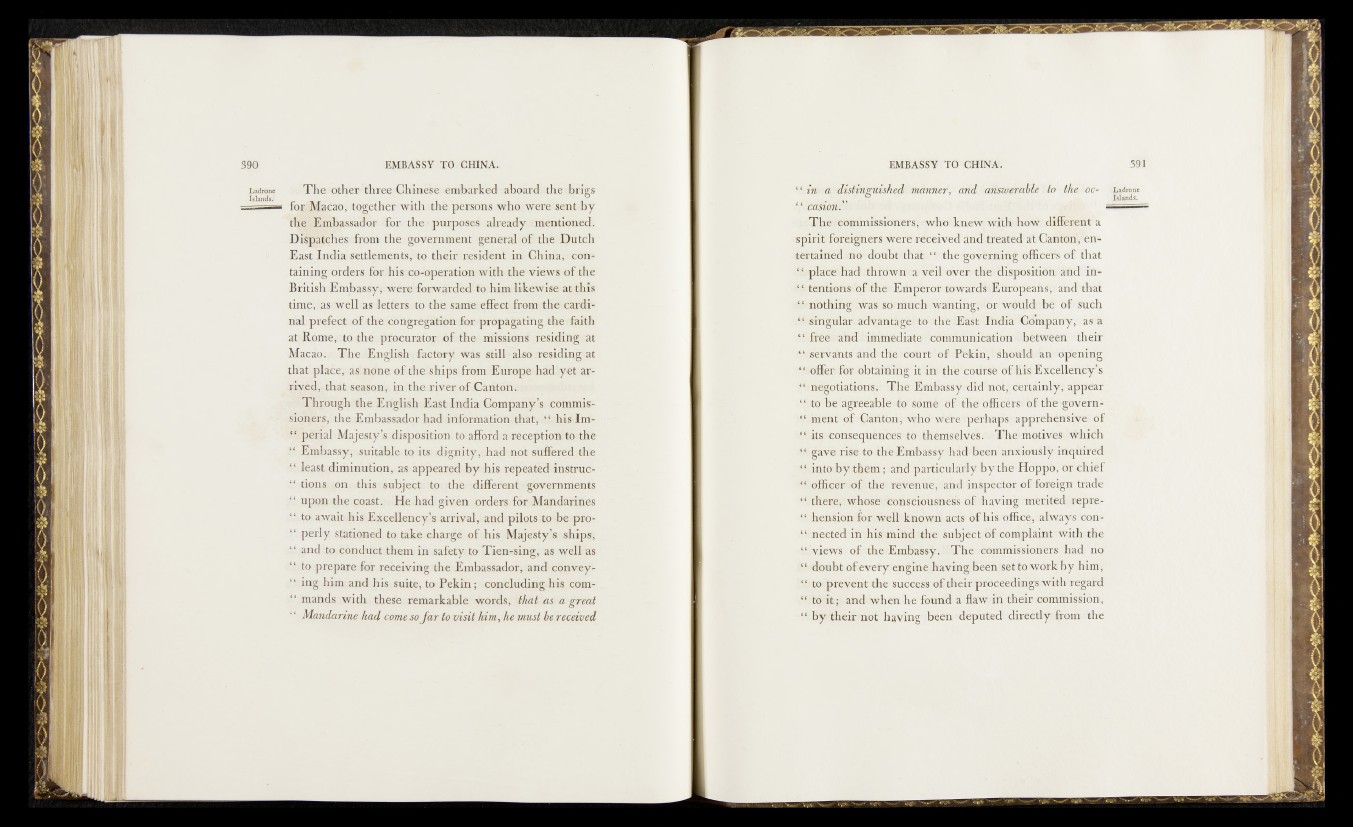
Ladrone The othenbhreecChinef ewernbarked-. aboard. >the brigs
- — fo r -M a c (toge ther with the persons .whcqyserds&eia'Uhy
the Embassador dfar the purposes -already .3 mentioned.
Dispatches »from -.tsbe gdvrernment general nf the Dutch
East India settlements* to their resident in? ChinayacoraE
taming ordersfor -hisiqoho.peration with the views.of the
British -Embassy? were-forwarded-to him likewise at this
limp, asiwelhas letters to the same, effect from the? oaasdi-
nal prefect, of the congregation for propagating the «faith
at Rome? \to the procurator of the missions tesiding sat
MacajTO The. English factory was still ’alsa:»®dinig®t
that pla«g|i a$none a£the.ships from E uroySihaffiyifciarr
. riye4, tha t se^o*;» ini the. riveB of iGaxit6h .) 5 ■
Through-'fehe> English East India Companyisvcommis-
sioners, the .Embassador hadinformatiom th a l^ his Im-
i^pefial Majesty’s idisposition to affordrasSEeeeptdoidto'the
“ Embassy, su itahle to its udignityy-had - not suffered; the
•v!cljea§trfiminution, as appeared by his repeatediinstruc^
“ tions ,on this. subject. ;to the differentjipwieBBments
‘i upon the coast. He had giYen prfeipsifo.r Mandarines
‘ ‘ to awaifehis Excellency’s arrival dandpilots:todaeHp®o-
‘‘ peiily stattpned to. take charge of this Majesty’s ships,
1“ anditmeonduet them in safety to Tien-sing?; as wefbas
Afdajp®epareTor receiving the Embassador, and ednwyi-
“ ing him and his suite, to Pekin; . concluding his com-
“ mands with these remarkable words,'dbat aSi a. great
“ Mandarine had come so fa r to visit him, he must be received
‘ g im 'd> distinguished* mànïeer, and ? '<aMsweæa b'ie.io fflaËSfe .-tadi-one „ * 5, c , rt . Islands. » on ' uj,
Th^èëftàhri^sibners,'ewho,knew< witb-tbow .different a
spirit foreighers5dréreïré%e“i¥i#àhd.tf‘éa1ied àtÆanlferi'ien-
tertairièd no^dcKibtf.that t<î!t^égovh|Klhîgr:®ffi'eei?s of that
Viiplaoè? had'jthrdwn^a* vdi-l*. ©ber < the dispOsitidfeïiâud in-
“ tenfeMsî,ofîdieteiE.Éîpfe'ë!BSltoward's5EtH!ropeafos|^and"'that
“ nothing iwas s'o^mUoh*wasntifeg?t ior?;wéuidübe of'such
è& singular.adyantàg^fblïthUHk-sfrilitdia f(3@mpbnyyds a
1‘iïfitèt^ahd dmftïediafé?dcôrnmunieatfion''i'bêtween j theit
A VservaSntffiiâtïd? thO>c@urb i of Thkii^'MhbMdtdanrrQpfenirig
‘feoffer .for : o.btaiaaS||pitbn« the“'icoitseSdfi Hi^Esc.élten'iiy^
‘ The' Erfb'as&iy-did’nob,'|®rertiinly-,fapipear
“ toheiagreeable do- somf^i<ifd-Ke>,offi©efs&bF thle‘.govern -
“ ment dlECanton, who Were>3p'erhap!s'7'apprek^n!s|\ieifof
11 ïtsfrcmïsequèhfesUct themseldfe^ " '>Th^diotivesf.L'v{drich
rièe to theEmba'ssy had<-beem ameiouily inquired
“ into by them; and'particularly b'ydhe ^Hoppb; 'orchief
‘■^tèoffiECrudf the revende j»adid ito'Splsdter of foreign? trade
fdhervetl whose'1‘b'onscrousneSsdEALavingH'mfeTiteds.repre-
“ hension for well?kffldwn a'efe of his office, .aLwaiyi^Gon-
iV^hstéeted in his mind the sufejêÇvBf? complakïüvwith the
-Mivfews:> of? the.Embassy. The Commis^éohters. 'had>; no
doubt ofevètylen-i-inÈ havingtbefeh get te work by Mnfcy
“ to prevent the succeÉ of tlieir proccedingk'with regard
“ to it; and: when he found a flaw in thêir commission,
“ By theif’not having been deputed directly from the